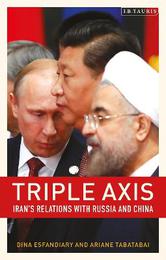
|
Triple-Axis: Iran's Relations with Russia and China
Paperback / softback
Main Details
| Title |
Triple-Axis: Iran's Relations with Russia and China
|
| Authors and Contributors |
By (author) Ariane Tabatabai
|
|
By (author) Dina Esfandiary
|
| Physical Properties |
| Format:Paperback / softback | | Pages:256 | | Dimensions(mm): Height 216,Width 138 |
|
| Category/Genre | International economics |
|---|
| ISBN/Barcode |
9780755640621
|
| Classifications | Dewey:327.55047 |
|---|
| Audience | | Tertiary Education (US: College) | |
|---|
| Illustrations |
3 maps
|
|
Publishing Details |
| Publisher |
Bloomsbury Publishing PLC
|
| Imprint |
I.B. Tauris
|
| Publication Date |
17 June 2021 |
| Publication Country |
United Kingdom
|
Description
The most significant challenge to the post-Cold War international order is the growing power of ambitious states opposed to the West. Iran, Russia and China each view the global structure through the prism of historical experience. Rejecting the universality of Western liberal values, these states and their governments each consider the relative decline of Western economic hegemony as an opportunity. Yet cooperation between them remains fragmentary. The end of Western sanctions and the Iranian nuclear deal; the Syrian conflict; new institutions in Central and East Asia: in all these areas and beyond, the potential for unity or divergence is striking. In this new and comprehensive study, Ariane Tabatabai and Dina Esfandiary address the substance of this `triple axis' in the realms of energy, trade, and military security. In particular they scrutinise Iran-Russia and the often overlooked field of Iran-China relations. Their argument - that interactions between the three will shape the world stage for decades to come - will be of interest to anyone looking to understand the contemporary international security puzzle.
Author Biography
Ariane Tabatabai is the director of curriculum and an assistant teaching professor of security studies in the Georgetown University School of Foreign Service; a senior associate in the Proliferation Prevention Program at the Center for Strategic and International Studies (CSIS); a columnist for The Bulletin of the Atomic Scientists; and a post-doctoral fellow (2017-2018) at the Harvard Kennedy School's Belfer Center, where she was previously a Stanton nuclear security fellow and an associate. Tabatabai's work has appeared in a range of scholarly publications, including International Security and The Journal of Strategic Studies, as well as in general-interest publications such as The New York Times, The Financial Times, and Foreign Affairs. She holds a Ph.D. from the Department of War Studies at King's College London. Dina Esfandiary is a CSSS Fellow in the War Studies Department at King's College London and an Adjunct Fellow in the Middle East Program at the Center for Strategic and International Studies (CSIS). Prior to joining King's College, she was a Research Associate in the Non-Proliferation and Disarmament Programme of the International Institute for Strategic Studies (IISS) in London, which she joined from a disarmament NGO in Geneva. Esfandiary's work has appeared in a range of publications, including Foreign Affairs, The Atlantic, The Guardian, The Washington Post, The National Interest, International Affairs, and The Washington Quarterly. She is the co-author of Living on the Edge: Iran and the Practice of Nuclear Hedging.
ReviewsRich, analytically sound, deeply insightful book ... Summing Up: Recommended. Upper-division undergraduates through faculty. * K. M. Zaarour, Virginia Polytechnic Institute and State University, CHOICE * Highly recommended for anyone interested in geopolitics. It has a seamless interdisciplinary approach, drawing on elements of political science, foreign policy, international political economy, security studies, history and even political sociology. The structure is logical, the research comprehensive and the analysis sound. Surprisingly, the narrative reads really easily. This makes it accessible to undergraduates as much as to policymakers, diplomats and senior scholars. * South African Journal of International Affairs *
|